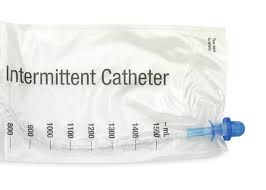What is self intermittent catheterization? If you suffer from incontinence or bladder problems that require the use of a catheter, read on to learn about this more convenient catheterization method.
If you’ve ever been to a urologist because you can’t urinate, you might have been given an indwelling catheter – a catheter that stays in the bladder and drains into a bag, usually attached to your leg – and been told to wait until the bladder recovers and return in a few days or a week. Sometimes this is from obstruction from an enlarged prostate (BPH) or from a bladder that doesn’t work properly (acontractile bladder) or a neurologic problem (Neurogenic bladder).
What is Self Intermittent Catheterization (SIC)?

“Self Intermittent Catheterization” (SIC) or “Clean Intermittent Catheterization” (CIC) is an alternative to leaving in an indwelling catheter. If you’re new to the world of urology (and even if you’re not) this might sound like something you couldn’t or wouldn’t want to do. This is not uncommon, but the feeling comes from a lack of knowledge or experience.
As you might have guessed from the name, SIC is when a patient inserts a catheter him/herself and allows the bladder to drain to completion before removing it. If this sounds simple, that’s because it is. Until the bladder recovers or is treated, you will catheterize yourself at intervals throughout the day to empty your bladder. Before each catheterization, you can try to urinate so you will be able to mark your own progress. If you get better, with the advice of your doctor, you will be able to stop catheterizing.
What Are The Benefits of SIC?
SIC might be useful to you as a temporary solution while waiting for your bladder to recover after surgery, or while you wait for other therapies; or it can be a permanent solution over the course of a lifetime if you have been diagnosed with permanent incontinence or urinary retention (though, as you’ll see in a future blog post, we’ve found that many patients diagnosed with untreatable urinary retention are eventually able to urinate okay with proper treatment).
In the rare case that you have a permanent problem, being able to catheterize yourself means you do not have to struggle with an indwelling catheter for the rest of your life, which can be uncomfortable and limiting and has a higher risk of infection, and even a small risk of developing cancer. Instead, you can control when you go to the bathroom, and you can take the catheter back out and continue to live your life as normal. For many, intermittent catheterization successfully replaces normal urination.
Will There Be Urination Complications?
Many people also find that they cannot urinate following various kinds of surgeries. Traditionally, the treatment for this would be an indwelling catheter until such a point when the physician felt the patient should be able to urinate then perform a “voiding trial.” This is the practice of removing the catheter and waiting for the patient to urinate. If the patient is unable to pee when the bladder is full, many physicians will reinsert the indwelling catheter until they feel the patient is ready to try again. This can put a lot of pressure on that patient’s first urination, and many will not be able to urinate to completion on their first try.
If the patient learns SIC instead of having a catheter reinserted, he can attempt to urinate every time he feels the urge and catheterize afterward for any residual urine. Once the residual shrinks to almost nothing, SIC can be discontinued.
Questions & Concerns About SIC
 At the UroCenter of New York, it’s not uncommon to hear from our patients that they’re afraid to try SIC, or that it’s absolutely not for them. Some of the questions we hear are: “Is it going to hurt?” “How will I know when it’s in far enough?” “Don’t I need to use sterile gloves?” Sterile technique has been proven to be unnecessary for the vast majority of patients, although some doctors and patients prefer it. Though SIC is not a guarantee against infection, the risk is far lower than an indwelling catheter or living with a residual urine. All that is required is that you wash your hands before and after the procedure and clean the penis or the labia around the entrance to the urethra.
At the UroCenter of New York, it’s not uncommon to hear from our patients that they’re afraid to try SIC, or that it’s absolutely not for them. Some of the questions we hear are: “Is it going to hurt?” “How will I know when it’s in far enough?” “Don’t I need to use sterile gloves?” Sterile technique has been proven to be unnecessary for the vast majority of patients, although some doctors and patients prefer it. Though SIC is not a guarantee against infection, the risk is far lower than an indwelling catheter or living with a residual urine. All that is required is that you wash your hands before and after the procedure and clean the penis or the labia around the entrance to the urethra.
The process itself is pretty simple. Once everything is clean, you apply lubricant to the tip of the catheter and gently slide it into the urethra. For women, a well-placed mirror can be helpful to locate the urethral opening (meatus) while you are learning, but will not be necessary afterwards. For men, the penis should be held at a forty-five degree angle from the body until the urine begins to come through the catheter; at which point he should aim the penis down and let gravity do the rest. Like most things, the more you do it, the easier it gets. At first, the patient will know that he or she has successfully reached the bladder when the urine begins to flow through the catheter, but eventually some patients can do it entirely by feel.
Does Self Intermittent Catheterization Hurt?
Though it may seem scary at first, for most people it actually doesn’t hurt at all. The very first catheterization can be uncomfortable, especially as you learn the technique, but once you’ve mastered SIC and performed it a few times the whole process becomes as easy and painless as a regular urination. In fact, in our office, we’ve often heard patients say, “That’s it?” following their first lesson. Catheterizing yourself is easier than having someone else do it.
One more thing. Most doctors and most patients think that it’s necessary to use a new sterile catheter each time you catheterize yourself. For the overwhelming majority of patients, this is simply untrue. In the vast majority of patients, all that is necessary is a single catheter and perhaps a spare that you carry around with you all the time and simply wash it out in the sink after each use. There is no need for sterile gloves only some lubricant which can be carried in individual packets the catheter and the packets of lubricant can be carried in a little plastic baggie.
Contact Dr. Balivas at Urocenter of New York
If you’re having trouble urinating or are suffering from incontinence, you should see a urologist to figure out the correct diagnosis and treatment. Dr. Jerry Blaivas treats each case individually and works with the patient to find the best treatment option that works for them and their lifestyle. Together we will determine if self intermittent catheterization is the right option for you.
Call today to schedule your confidential consultation:
646-205-3039
For more information, visit our main website: http://www.urocenterofnewyork.com






 At the UroCenter of New York, it’s not uncommon to hear from our patients that they’re afraid to try SIC, or that it’s absolutely not for them. Some of the questions we hear are: “Is it going to hurt?” “How will I know when it’s in far enough?” “Don’t I need to use sterile gloves?” Sterile technique has been proven to be unnecessary for the vast majority of patients, although some doctors and patients prefer it. Though SIC is not a guarantee against infection, the risk is far lower than an indwelling catheter or living with a residual urine. All that is required is that you wash your hands before and after the procedure and clean the penis or the labia around the entrance to the urethra.
At the UroCenter of New York, it’s not uncommon to hear from our patients that they’re afraid to try SIC, or that it’s absolutely not for them. Some of the questions we hear are: “Is it going to hurt?” “How will I know when it’s in far enough?” “Don’t I need to use sterile gloves?” Sterile technique has been proven to be unnecessary for the vast majority of patients, although some doctors and patients prefer it. Though SIC is not a guarantee against infection, the risk is far lower than an indwelling catheter or living with a residual urine. All that is required is that you wash your hands before and after the procedure and clean the penis or the labia around the entrance to the urethra. Urologic Problems in Men
Urologic Problems in Men Urologic Problems in Women
Urologic Problems in Women